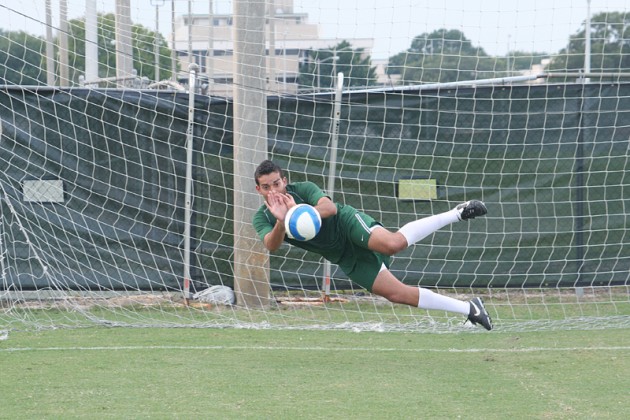Diego Restrepo’s difficult decision

USF starting goalkeeper Diego Restrepo’s life has been all about hard choices, with the hardest one coming at the age of 16: playing soccer for the United States or waiting for the call to play for his homeland, Colombia.
Early in his career, Restrepo shot to soccer’s highest level, even though he wasn’t interested in playing until he was 14. He started out as a field player, but it didn’t take him long to find that his place on the field was between the posts.
“I started playing in Orlando when I was 14. Two years later, I was already being called up to be the third-string goalie for the U.S. Under-17 (U-17) national team,” Restrepo said.
FIFA, the governing body of soccer, has rules stating that after playing one match with a national team, players can’t play for another, so Restrepo had to decide whether to wait for a call from his native Colombia or be part of the U.S. national team.
“It was never in question for me. I love Colombia, but this country has given me so much that I never doubted about being part of the U.S national team,” he said.
Restrepo played in the 2005 U-17 World Cup in Peru, where he played against star team Manchester United. Restrepo took that experience and went on to practice with the U.S. Under-20 (U-20) team before playing at the 2007 U-20 World Cup as the fourth-string goalie.
“It was amazing. I got to play against the best players in the world in 2005 and now I was practicing with world-class players like Freddy Adu and Jozy Altidore,” Restrepo said.
Restrepo remained until the last week of practice in 2005, when he was one of two players cut just before the World Cup.
“That hurt, but it helped me mature and I learned a lot from it,” he said.
Having traveled all over the world with the U.S. national team, Restrepo has experienced other countries’ soccer fans’ hatred for the United States.
“They think we are a bad team, but we can play with the best European countries in the world,” Restrepo said. “Some of the things that other players and fans have said about us on and off the field make us want to prove them wrong.”
Restrepo has also played for prestigious professional soccer teams like the English Premier League’s Reading, Germany’s Borussia Dortmund — which won the UEFA Champions League and the Intercontinental Cup in 1997 — and Arezzo, an Italian Serie B team (Italy’s version of Division 1-AA for the pros). It is his fourth year at USF and his third as a starter.
“The way I deal with Diego and any other player is that you have to wait for your opportunities and then weigh them out,” USF coach George Kiefer said.
“The main thing I want from Diego is to pursue his degree as long as he is here at USF, so then if he does end up leaving, he is as close as he can get to graduating.”
Even though he has a distinguished career, Diego comes and goes across campus virtually unrecognized.
Restrepo said he enjoys his on-campus anonymity when he spends time with his three best friends from the team: Bernardo Anor, Francisco Aristeguieta and Jorge Mora.
“Diego is a great teammate who works hard every time he is on the field. He is also a prankster in the locker room,” Anor said.
Restrepo said the Latin players of the team are especially close, but when the team is on the road, like it was last weekend in Indiana, everyone gets along.
“We pull pranks on each other and have as much fun as we can have,” he said.
Restrepo leans heavily on his brother Alfonso, who is five years older and helped him get through the tough transition of moving to the U.S.
“I was 15 and Diego was 10 when we came to the U.S., so I wasn’t his brother (or his) friend, I was more like his second dad,” Alfonso Restrepo said. “I made sure he knew what things were the right things to do, went to every one of his practices, and helped him get his chance with the U.S. national team.”
Diego Restrepo said he is very thankful for what USF has given him — namely, a free education and an opportunity to play the sport he loves.
His aspirations, however, don’t end there.
“I want to be a part of a U-23 national team (which goes to the Olympics) and try to be a part of the 2014 or 2018 World Cups — my dream is to play soccer professionally,” he said.







